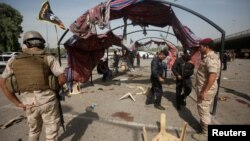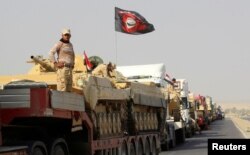A suicide bomber struck a Shi'ite Muslim religious observance Sunday in Baghdad, killing at least two people and wounding four.
There was no immediate claim of responsibility for the attack, but it is similar to other assaults carried out by the Islamic State.
Another suicide bomber in Baghdad killed more than 35 people and wounded 50 others Monday observing the same Muslim ritual.
A tweet sent in the name of the Islamic State group claimed responsibility for Saturday's attack, which it said was carried out by "the martyrdom-seeking brother Abu-Fahd al-Iraqi."
Bombing decried
The United States and Iran condemned Saturday's attack and extended condolences to the victims.
A statement issued in Washington denounced "the barbaric terrorist attack" as "yet another sign of [Islamic State's] cowardice and contempt for human life.
U.S. officials said the bombing was an "attempt to sow sectarian discord among the people of Iraq ... [that] only underscores the importance of coalition efforts to support Iraqi security forces."
"The United States remains committed to that goal," they added.
From Tehran, Fars news agency reported the Iranian foreign ministry called on the international community to support the Iraqi government "until the complete failure of the terrorists."
Many people there were commemorating the death of Hussein, the Prophet Muhammad's grandson, in a seventh-century battle near the Iraqi town of Karbala. Others in the crowd were taking part in a funeral procession for a local resident.
Islamic State, most of whose members are Sunni Muslim extremists, considers Shi'ites to be heretics. Saturday's bombing was the deadliest attack in the Iraqi capital since early July, and it also came at a time when Iraqi government forces are making final preparations for a battle to retake the IS-held northern city of Mosul.
Hilal Khashan, who teaches political science at the American University of Beirut, told VOA the battle for Mosul is likely to stir up further sectarian tensions, including more suicide bombings.
"I think that once ISIS is defeated in Mosul, we will see more and more suicide attacks," Khashan said. "Even with the capture of Mosul it will be too early to celebrate victory against Islamic State. ISIS doesn’t spare anybody, but needless to say they have a vested interest in targeting Iraqi Shi’ites.”
Complex effort
The coming battle for Mosul is expected to be the most difficult and complex yet in the war against Islamic State. A coalition of diverse and sometimes rival Iraqi forces will have to fight through elaborate IS defenses to reach Mosul, which has a large civilian population.
The prospect of lengthy street fighting between Iraqi forces and die-hard jihadists has led many analysts and aid officials to warn of an expected humanitarian crisis, with up to a million people displaced by the fighting as winter sets in.
Iraqi Prime Minister Haidar al-Abadi, visiting government-held areas near Mosul Saturday, urged Iraqis from all sectarian groups to unite to recapture the city and destroy Islamic State.
In addition to the suicide attack on Shi'ites marking Ashura, separate attacks by militants in two areas north of Baghdad Saturday killed another 12 people.
VOA's Steve Herman contributed to this report.












